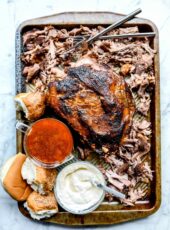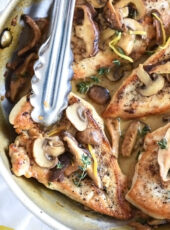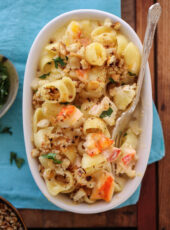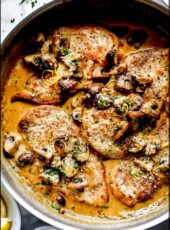These shrimp, pesto and quinoa bowls are delicious, healthy, and pretty and take less than 30 minutes to prep. In other words, they’re basically the ultimate easy weeknight dinner. Feel free to add additional vegetables and swap the shrimp for chicken, steak, tofu or edamame.
In This Post
Ingredients
⅓ cup prepared pesto
2 tablespoons balsamic vinegar
1 tablespoon extra-virgin olive oil
½ teaspoon salt
¼ teaspoon ground pepper
1 pound peeled and deveined large shrimp (16-20 count), patted dry
4 cups arugula
2 cups cooked quinoa
1 cup halved cherry tomatoes
1 avocado, diced
Local Offers
00000
Directions
Whisk pesto, vinegar, oil, salt and pepper in a large bowl. Remove 4 tablespoons of the mixture to a small bowl; set both bowls aside.
Heat a large cast-iron skillet over medium-high heat. Add shrimp and cook, stirring, until just cooked through with a slight char, 4 to 5 minutes. Remove to a plate.
Add arugula and quinoa to the large bowl with the vinaigrette and toss to coat. Divide the arugula mixture between 4 bowls. Top with tomatoes, avocado and shrimp. Drizzle each bowl with 1 tablespoon of the reserved pesto mixture.
Tips
To make ahead: Cover and refrigerate dressing (Step 1) for up to 2 days.
Nutrition Facts (per serving)
| 429 | Calories |
| 22g | Fat |
| 29g | Carbs |
| 31g | Protein |
| Nutrition Facts | |
|---|---|
| Servings Per Recipe 4 | |
| Serving Size 2 1/2 cups | |
| Calories 429 | |
| % Daily Value * | |
| Total Carbohydrate 29g | 11% |
| Dietary Fiber 7g | 26% |
| Total Sugars 5g | |
| Protein 31g | 62% |
| Total Fat 22g | 28% |
| Saturated Fat 4g | 18% |
| Cholesterol 188mg | 63% |
| Vitamin A 1126IU | 23% |
| Vitamin C 14mg | 16% |
| Folate 109mcg | 27% |
| Sodium 571mg | 25% |
| Calcium 205mg | 16% |
| Iron 3mg | 16% |
| Magnesium 131mg | 31% |
| Potassium 901mg | 19% |
Nutrition information is calculated by a registered dietitian using an ingredient database but should be considered an estimate.
* Daily Values (DVs) are the recommended amounts of nutrients to consume each day. Percent Daily Value (%DV) found on nutrition labels tells you how much a serving of a particular food or recipe contributes to each of those total recommended amounts. Per the Food and Drug Administration (FDA), the daily value is based on a standard 2,000 calorie diet. Depending on your calorie needs or if you have a health condition, you may need more or less of particular nutrients. (For example, it’s recommended that people following a heart-healthy diet eat less sodium on a daily basis compared to those following a standard diet.)
(-) Information is not currently available for this nutrient. If you are following a special diet for medical reasons, be sure to consult with your primary care provider or a registered dietitian to better understand your personal nutrition needs.
Powered by the ESHA Research Database © 2018, ESHA Research, Inc. All Rights Reserved
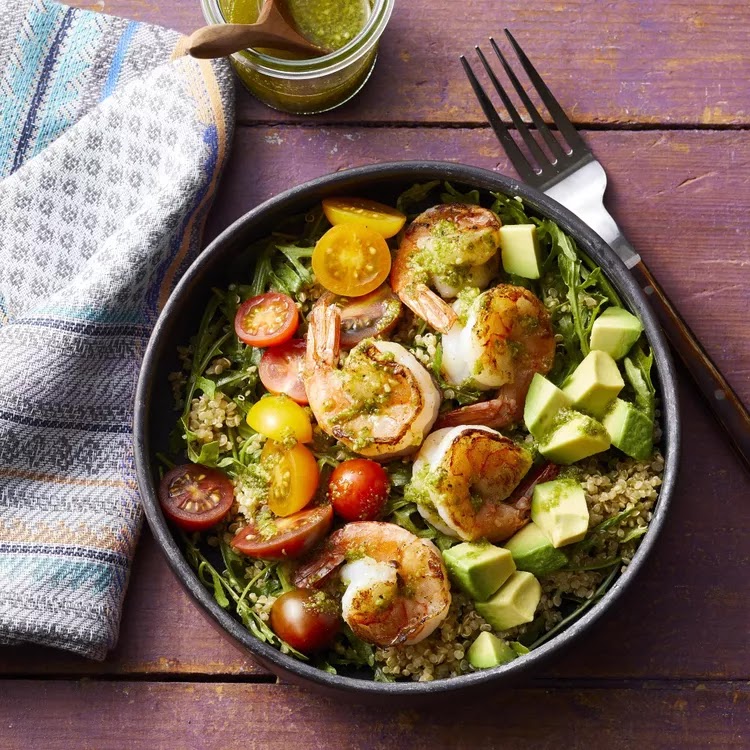
:max_bytes(150000):strip_icc():format(webp)/6707072-9c95fd6020c0463c86ba79e4baf20548.jpg)
